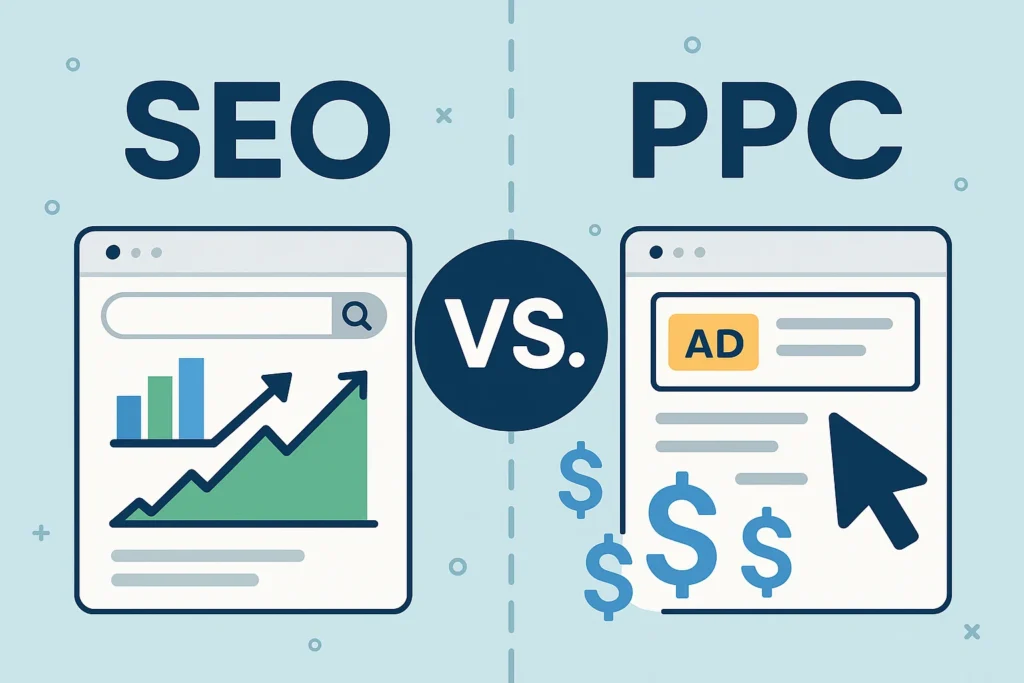INTRODUCTION
When it comes to driving traffic to your website, two major approaches dominate digital marketing: Search Engine Optimization (SEO) and Pay-Per-Click (PPC) advertising. This ongoing debate, often referred to as SEO vs PPC, highlights the unique strengths and weaknesses of each strategy. Choosing the right one depends on your goals, budget, and timeline. By understanding the key differences between SEO vs PPC, you can make a smarter decision that boosts your website’s visibility and drives meaningful results.
SEO OVERVIEW
SEO stands for Search Engine Optimization, a method that focuses on improving your website’s visibility in organic search engine results. Instead of paying for each visitor, SEO involves optimizing content, keywords, and website structure so that it naturally ranks higher on search engines like Google.
Search engines look for quality content, relevance, and user experience. SEO is a long-term strategy and can deliver sustainable traffic when done right.
Pros and Cons of SEO
Pros:
- Cost-effective: Once ranked, traffic is essentially free.
- Sustainable: Good SEO can bring long-term benefits.
- Builds trust and credibility: Users often trust organic results more.
- Better click-through rates (CTR): Organic listings typically attract more clicks than ads.
Cons:
- Takes time: Results can take weeks or even months.
- Ongoing effort: Regular updates and maintenance are necessary.
- Algorithm changes: Search engines can update algorithms, which may impact rankings.
What are the use cases for SEO?
SEO is ideal for:
- Content-heavy websites like blogs, news portals, and educational platforms.
- Businesses with a long-term strategy, where sustained traffic is the goal.
- Companies looking to build authority in their industry.
- Startups with limited budgets who want to attract organic traffic without high ad costs.
PPC OVERVIEW
PPC, or Pay-Per-Click, is a model of online advertising where advertisers pay a fee each time their ad is clicked. It allows your website to appear at the top of search engine results immediately, often marked with a small “Ad” label.
The most common PPC platform is Google Ads, where businesses bid on keywords to show their ads to a targeted audience.
Pros and Cons of PPC
Pros:
- Immediate results: Your site can appear at the top instantly.
- Precise targeting: Reach people based on location, device, demographics, and more.
- Scalability: Easy to adjust budget and reach.
- Great for short-term goals like sales or product launches.
Cons:
- Can be expensive: Especially in competitive industries.
- Temporary: Traffic stops once the campaign ends.
- Learning curve: Requires knowledge of platforms like Google Ads.
What are the use cases for PPC?
PPC is best for:
- Product launches or limited-time offers where quick visibility is needed.
- Highly competitive markets where SEO may take too long.
- Businesses with clear ROI metrics looking to scale fast.
- Testing new products or pages to gauge audience interest quickly.
PPC vs. SEO: A Comparative Analysis
Before diving deeper into the comparison, it’s important to understand that SEO and PPC aren’t rivals — they are tools. The key is knowing which one to use and when.
Cost-effectiveness
While PPC gives faster results, SEO is more cost-effective over the long term. You keep paying for PPC every time someone clicks, while SEO keeps bringing traffic without ongoing payments (aside from maintenance and content creation). If your budget is tight, SEO might be the smarter investment.
Speed of Results
PPC offers immediate visibility, making it ideal for time-sensitive campaigns. SEO, on the other hand, is a long-term strategy that builds momentum over time. If you need quick results, PPC is the way to go; for sustainable growth, invest in SEO.
Targeting Capabilities
PPC allows for precise targeting based on demographics, location, device, and more. SEO targets users based on search intent and keywords. If you need to reach a specific audience segment quickly, PPC provides more control.
Trust and Credibility
Organic search results are often perceived as more trustworthy by users. SEO helps build credibility over time, while PPC ads are clearly marked and may be skipped by some users.
Click-Through Rates (CTR)
Studies have shown that organic listings generally receive higher CTRs compared to paid ads. However, PPC ads at the top of the page can still attract significant clicks, especially for commercial queries.
Conversion Rates
PPC campaigns can be optimized for conversions with tailored landing pages and A/B testing. SEO traffic may have varying conversion rates depending on the content and user intent. PPC offers more immediate control over conversion optimization.
Choosing Between PPC and SEO: What’s Best and When?
When to use PPC
- You need immediate traffic for a product launch or sale.
- You’re testing new offers or landing pages.
- You want to dominate competitive keywords that are too difficult to rank organically.
- You have a flexible marketing budget.
When to use SEO
- You are building a long-term brand.
- You want to reduce paid ad spending over time.
- Your focus is on content marketing and educating users.
- You’re targeting non-competitive niches where organic ranking is easier.
How to Use SEO and PPC Together
Combining SEO and PPC can give you the best of both worlds. Here’s how:
- Test with PPC, expand with SEO: Use PPC to test which keywords convert best, then focus SEO efforts on those.
- Double visibility: Show up in both paid and organic results to boost credibility and CTR.
- Data sharing: Use insights from PPC campaigns to improve your SEO strategy (e.g., high-converting keywords).
- Retargeting: Use PPC to bring back users who visited your site through SEO but didn’t convert.
A unified approach helps you cover both short-term and long-term goals.
TABULAR FORM: Pay Per Click (PPC) vs Search Engine Optimization (SEO)
| Feature | SEO | PPC |
| Cost | Free traffic, but requires effort | Pay for each click |
| Time to Results | Slow (months) | Fast (immediate) |
| Longevity | Long-lasting | Ends when the budget is exhausted |
| Credibility | High (organic trust) | Lower (marked as ads) |
| Targeting | Limited to content and keywords | Precise targeting options |
| Control | Less control over ranking changes | Full control over ads and budget |
| Ideal For | Long-term brand building | Quick traffic and sales |
Conclusion
Both SEO and PPC offer unique advantages, and the best approach depends on your business goals. SEO helps build a long-term foundation for your website’s visibility, while PPC can drive quick traffic and measurable ROI.
A well-balanced marketing strategy doesn’t rely solely on one method. Instead, it uses SEO for sustainable growth and PPC for instant results. By understanding their differences and how they complement each other, you can create a more effective digital strategy that delivers better performance over time.
Frequently Asked Questions (FAQ)
Is SEO or PPC better for my business?
It depends on your goals. If you’re looking for immediate traffic and have a budget, PPC is effective. For long-term growth and cost-effective traffic, SEO is beneficial. Often, a combination of both works best.
How long does it take to see results from SEO?
SEO is a long-term strategy. It can take several months to start seeing significant results, depending on competition and the quality of your optimization efforts.
Can I stop my SEO efforts once I rank high?
No. SEO requires ongoing effort to maintain rankings, as competitors and search engine algorithms change over time.
Is PPC traffic more likely to convert than SEO traffic?
PPC allows for precise targeting and tailored landing pages, which can lead to higher conversion rates. However, SEO traffic can also convert well if the content matches user intent.
Can I use SEO and PPC together?
Absolutely. Using both strategies can maximize visibility, drive more traffic, and provide valuable data to refine your marketing efforts

Vrushang Patel is an SEO expert with over 3 years of experience helping websites show up better on Google. He knows how to find the right keywords, improve web pages, and make content work well online. In his free time, he likes to write simple blog posts to share tips and help others learn about SEO.

